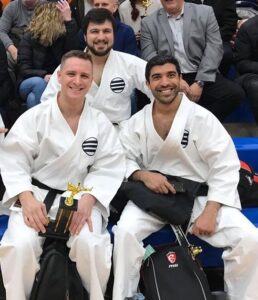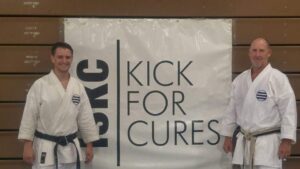
A Life in Motion
When he was five years old, Dr. Jack York, DO, Site Medical Director of Erie HealthReach Waukegan Health Center, was a whirlwind—powered by too much Power Rangers, too much imagination, and far too much energy to stay still for more than a few seconds at a time. His dad, amused but slightly overwhelmed, decided it was time to channel all that enthusiasm somewhere productive. So Jack was signed up for a parent–child karate class at the Illinois Shotokan Karate Club (ISKC).
A session later, his dad joined him—and the two have been training side by side ever since.
What began as something to keep a wild child busy quickly became the thread that tied together every chapter of Jack’s life. By the time he earned his black belt at fifteen, ISKC had become more than a club; it was a community, a grounding force, and eventually, a second home. He started assistant teaching as a teenager and continued through undergrad, where he earned an academic scholarship through the club. The scholarship wasn’t just financial support—it came with a commitment: teach classes, train multiple times a week, work belt tests, and referee at tournaments. It was a lot to take on for a college student balancing band, soccer, a part-time job, mountains of homework, and an entire roster of extracurriculars.
But the routine kept Jack grounded.
Karate had become a constant—something that asked no more of him than to show up, breathe, and try. Not to be perfect, because perfection doesn’t exist, but to grow. To improve. To persist. “We can do hard things,” the instructors would remind him, and he learned to believe it.
Along the way, the dojo became its own extended family. The senior instructors—talented, passionate, deeply invested people—shaped him as much as they taught him. Sensei Cieplek, Jack’s instructor from middle school through college, was especially influential. He was old-school, traditional, and held his students to exacting standards. Hard feedback was his love language. “If I’m giving you something to work on,” he’d say, “it’s because I care. If I ignore you—that’s when you should worry.”
That philosophy became the backbone of Jack’s growth mindset and later influenced how he navigated medical training. Feedback wasn’t an attack—it was an investment. Improvement wasn’t punishment—it was opportunity.
As he grew older, karate shifted from a competitive and instructional pursuit—point fighting, kata, tournament seasons—to something quieter and more personal. A meditative flow state. A protected hour away from the pressures of medical school, residency, and now clinical practice. Even when time was tight, even when life pulled him in a hundred directions, the dojo remained a place where Jack could breathe.
Jack still trains weekly alongside some of his closest friends—and his dad, now a third-degree black belt. They stand in the senior division these days, which ranges from thirty-five all the way up to eighty-five. “The York family brawl,” they joke, as they bow in before class.
The lessons learned in the dojo bleed naturally into Jack’s work. Karate gave him confidence, poise under pressure, and the ability to think on his feet—skills essential for working with patients. Teaching sharpened his communication style; years of adjusting explanations for ten-year-olds now help him adjust naturally to different patients and colleagues. Even the physical awareness translates—he’s caught himself during more than one near-slip in the hospital, instinctively regaining balance before disaster hit.
But more than anything, karate taught him how to approach life:
- With perseverance.
- With humility.
- With the belief that there is always a next step—always a way to grow.
Karate started as an outlet for a wild five-year-old. It became a lifelong discipline, a sanctuary, and a guiding philosophy. It carried Jack through childhood, adolescence, undergrad, medical school, residency, and into professional life. And it continues to shape the way he moves through the world today.
Because after a lifetime of bowing onto hardwood floors, sweating through kata, accepting critiques, practicing Bunkai, and returning to the mat again and again, one truth has stayed constant:
You don’t need perfection.
You just need to keep going.



